Newsletter 2019/2
May 2019
Introduction
Shortly after the reading of the Judgment in The M/V “Norstar” Case (Panama v. Italy) and the closure of the Tribunal’s 25th case on 10 April 2019, a request for the prescription of provisional measures under article 290, paragraph 5, of the Convention was submitted to the Tribunal by Ukraine in a dispute with the Russian Federation. Urgent proceedings before the Tribunal have priority over all other proceedings before the Tribunal and, as a rule, hearings on requests for the prescription of provisional measures take place two to three weeks after the request has been filed with the Tribunal. In the Case concerning the detention of three Ukrainian naval vessels (Ukraine v. Russian Federation), Provisional Measures, the hearing took place on 10 May 2019 and the Order was delivered on Saturday, 25 May 2019. On 22 May 2019, a new case (Case No. 27) was submitted to the Tribunal by Switzerland in a dispute with Nigeria. This new case also relates to a request for the prescription of provisional measures under article 290, paragraph 5, of the Convention, concerning a dispute relating to the M/T “San Padre Pio”. The date for the hearing will be announced in the coming days.
Since the first urgent proceeding submitted to the Tribunal in 1997 (The M/V “SAIGA” Case (Saint Vincent and the Grenadines v. Guinea), Prompt Release), the Tribunal has proved that the procedure established to deal with urgent proceedings enables us to handle cases efficiently and expeditiously. From the day that a dispute is submitted to the Tribunal we work closely with the parties to ensure that their needs and requirements are met, be it in fixing dates for the oral procedure, setting time limits for the submission of relevant documents or allocating time to parties during the oral proceedings. Over the years we have delivered Orders in provisional measures cases and Judgments in prompt release cases in a time frame of four to five weeks.
Unfortunately, as a result of the new cases, the 14th regional workshop of the Tribunal planned to be held in Uruguay in May had to be postponed. The good news for the workshop in Uruguay is that it will take place later in the year and we are working with the Ministry of Foreign Affairs of Uruguay to find an alternative date for the participants to meet with myself, Judges Kelly, Cabello and Heidar, Registrar Gautier and Deputy Registrar Hinrichs.
Two of the other capacity-building programmes have been open for the receipt of applications in the last three months and the selection of candidates for both the ITLOS-Nippon Foundation Capacity-Building and Training Programme on Dispute Settlement under UNCLOS and the International Foundation for the Law of the Sea Summer Academy is underway. We look forward to welcoming the participants in both of these programmes to the Tribunal in the summer.
In the meantime, for those of you who might have the opportunity to come to Hamburg to attend the upcoming hearing in The M/T “San Padre Pio” Case (Switzerland v. Nigeria), Provisional Measures, please do not hesitate to do so. For those who are unable to attend, the sittings will be broadcast live on the website as usual.
With my warmest regards,
Jin-Hyun Paik
President
ITLOS Cases
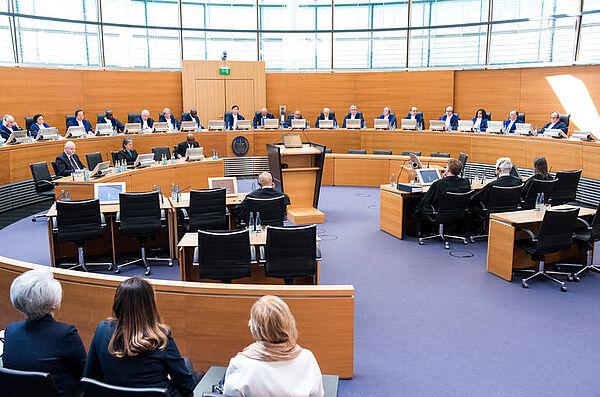
The Judgment in The M/V “"Norstar"” Case (Panama v. Italy) was delivered on 10 April 2019.
The Order in the Case concerning the detention of three Ukrainian naval vessels (Ukraine v. Russian Federation), Provisional Measures was delivered on 25 May 2019.
The M/T “San Padre Pio” Case (Switzerland v. Nigeria), Provisional Measures
The date of the oral proceedings in the case will be announced soon.
Interview with Judge Elsa Kelly (Argentina)
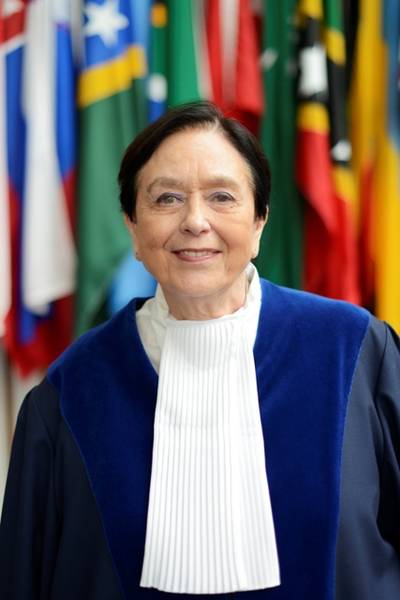
You have been on the bench since 2011. How do you feel the Tribunal has developed in this time?
With each case and with each decision, I believe that the Tribunal is getting stronger. Over the years, States have come to regard the Tribunal as a serious court of law and the jurisprudence of the court has made a great contribution to the development of international law. This has clearly been welcomed by the international community as a positive development. The judgment in the last case, concerning freedom of navigation on the high seas for vessels engaged in commercial activities, was closely followed by the submission of a new case, this time looking at the detention of three naval vessels and their crew. I am sure that many more cases will follow on a variety of topics, be it delimitation, in particular of the outer continental shelf beyond 200 nautical miles, protection of the marine environment, climate change or the Area. With issues relating to the Area in particular, I see great scope for parties to use the advisory function of the Tribunal. There are questions concerning seabed mining currently under debate and many others which have yet to surface that could be brought before the Seabed Disputes Chamber for clarification by way of an advisory opinion before an actual dispute arises. On a personal level, protection of the marine environment and climate change are two areas of particular importance to me as I chair the Committee on Environmental Issues for the Argentine Council for International Relations (CARI), a non-profit academic institution that assesses the political, economic, cultural and social dimensions of international relations and how they might impact Argentina. We organize study visits, meetings and conferences for experts from scientific institutions, economists and diplomatic representatives to discuss and draft recommendations on these issues to support the work of the Argentine government. These are certainly issues which are growing in relevance and which may well find their way before the Tribunal in time.
You will be taking part in the next regional workshop of the Tribunal in Uruguay. How important is outreach for the Tribunal in the Latin American area?
As a Judge from the Latin American region, I can only really speak about the States in my region but I think that what I say could still be applied all over the world. Although the Tribunal is now 22 years old, it is still far from being a household name in Latin America. We have a lot to do to increase the level of general knowledge and understanding about the work of the Tribunal at many levels – from students selecting their first courses in international law through to government representatives working in the ministries dealing with issues related to the law of the sea. The capacity-building programmes organized at the seat of the Tribunal for students, young diplomats and researchers certainly have a great impact in spreading knowledge – and it is always a pleasure to meet with the interns and fellows from the region when I am in Hamburg – but I also believe that the regional workshops have a great effect. The Montevideo workshop will be the fifth in the Latin American region since the series was launched in 2006. Over the last 13 years we have held workshops in Kingston, Buenos Aires, Mexico City and San José, inviting government representatives from the region to meet with the President and Judges for two days of presentations and discussions on matters of particular interest to the area. I am looking forward to the presentations on procedural issues, urgent proceedings and advisory opinions before the Tribunal, to our sessions on delimitation and fisheries disputes and to the ensuing discussions.
Going back to the academic world, I hope that the law faculties in the Latin American region will develop their programmes to include more courses on the law of the sea so that students can discover and specialize in this fascinating area of law. As the importance of the oceans grows, so too does the need for our governments to have adequately trained people with the right legal tools to protect and preserve our coasts and resources. As a starting point I can only encourage students from the area to consider applying for the three-month internship programme run by the Tribunal, which can be supported by funding for travel and subsistence from the Tribunal’s Trust Fund for the Law of the Sea. Thereafter, for researchers or young government officials with experience in the field, there is the nine-month fully-funded capacity-building programme organized by the Tribunal together with the Nippon Foundation. Since 2007, only 14 fellows on the programme have come from the region – I can only encourage governments and institutes to consider nominating candidates so that we have at least one, if not two, fellows from the Latin American region on this programme each year.
ITLOS conferences and events
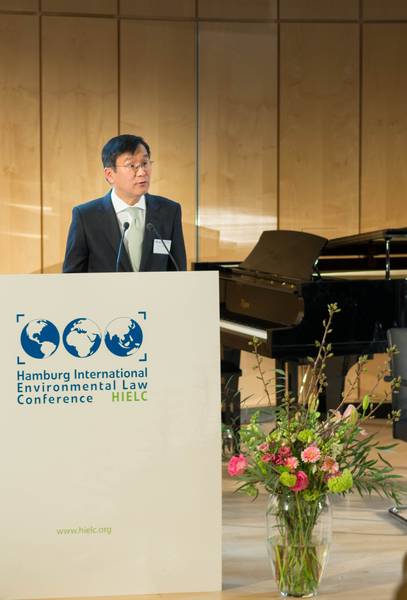
During his visit to Japan in February, President Paik gave a lecture on 14 February 2019 entitled “Contribution of ITLOS to the rule of law” as part of the “Ocean Forum” lecture series co-hosted by the Ocean Policy Research Institute and the Ministry of Foreign Affairs of Japan in Tokyo. On 17 February 2019, the President gave a speech at a reception organized on the occasion of the Philip C. Jessup International Law Moot Court Competition, Japan Round, hosted by the Japan International Law Students Association (JILSA), at Kyoto University.
President Paik addressed the Legal Service of the European Commission in Brussels on 22 February 2019, speaking on “The Rule of Law in the World’s Oceans: the Role of ITLOS and International Arbitration”. Closer to home, President Paik addressed participants at the Hamburg International Environmental Law Conference, which focused on responsible maritime governance, on 4 April 2019, and gave a lecture at the Max Planck Institute for Comparative and International Private Law in Hamburg on 24 April 2019.
Capacity Building
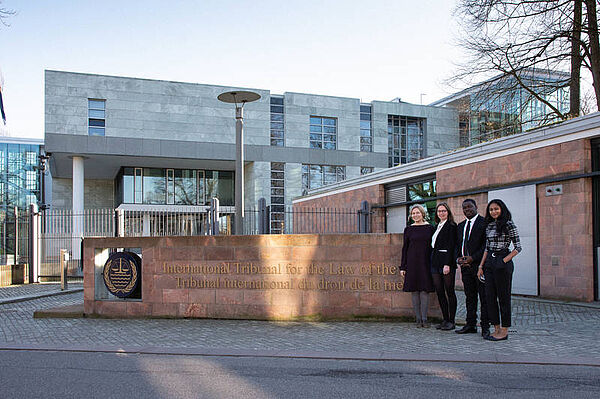
ITLOS-Nippon capacity-building and training programme on dispute settlement under UNCLOS
We congratulate Ms Zainaba Abdallah Bachirou (Comoros), Mr Boniface Adjokpo (Benin), Ms Xinling Mary-Elisabeth Chong (Singapore), Ms Grace Kaue (Papua New Guinea), Ms Olena Semenova (Ukraine) and Mr Julian Rosenthal (Argentina) on the successful completion of the 12th ITLOS-Nippon capacity-building and training programme on dispute settlement under UNCLOS!
The last two months of the programme involved an intense programme of visits to the International Maritime Organization, the International Oil Pollution Compensation Funds, the North East Atlantic Fisheries Commission and OSPAR in London as well as to the Federal Institute for Geosciences and Natural Resources in Hanover and the Alfred Wegener Institute Helmholtz Centre for Polar and Marine Research in Bremerhaven. Lectures continued until the last week, while every free moment was used by the fellows to complete their research papers and practise their presentations for the closing ceremony.
Each year, the programme culminates in the presentation of the fellows’ research to the Judges. This year the following topics were presented: “La responsabilité du Togo pour la pollution des eaux marines béninoises par les rejets de boues de l’usine de phosphate de Kpémé au Togo”; “An analysis of the use and incorporation of external norms by international adjudicative bodies within the UNCLOS regime”, “Responsibilities of coastal States in mining the seabed”, “Compensation fund for environmental damage in the Area and implementation of international obligations into national legislation”; and “The role of historic titles in the law of the sea: distinction, evolution and its importance in the light of the contemporary case of the South China Sea”.
The call for applications for the 2019/2020 programme was announced at the end of March with the deadline for submissions set for 30 April 2019. All applications are currently under review and the successful candidates will be featured in the next newsletter.
Internship programme
Interns with the Legal Office have the chance to attend some of the lectures organized for the fellowship programme and to join the fellows on some of their local visits: Lili, Esmel and Sebastian joined the excursions to the Federal Institute for Geosciences and Natural Resources and the Alfred Wegener Institute. As with the fellows, interns are expected to draft a research paper during their internship which they present to the Legal Office at the end of the internship. The last three interns gave presentations on “The Establishment of the Environmental Liability Trust Fund: Bridging Liability Gaps in Deep Seabed Mining Regime”, “La CNUDM dans le processus de délimitation de la frontière maritime Ghana/Cote D’Ivoire: Quel impact?” and “Revisiting the Jurisdiction of the SDC Concerning Disputes Arising Between a Contractor and the ISA or its Sponsoring State”. In April we welcomed Ekaterina Antsygina (Russian Federation), Joseph Ouaga (Côte d’Ivoire), Laurène Simon (France) and Sindhura Polepalli (India) to the Tribunal. They will be with us until the end of June.
Meet ITLOS alumni
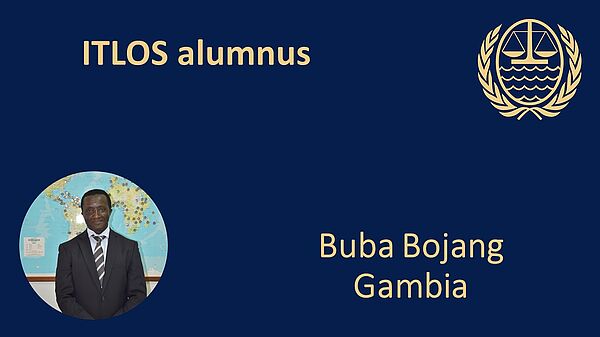
Dr Buba Bojang (ITLOS-Nippon Fellow 2012-2013), Nippon Foundation Lecturer on Ocean Governance at the IMO International Maritime Law Institute (IMLI), Malta, since 2016.
I can say, without a shadow of ambivalence, that whatever I do today in terms of my career, work and position as a lecturer has, to a large extent, been influenced by my training at ITLOS as a Nippon Fellow. I was at ITLOS a little over a year after my training at IMLI. It was at the very embryonic stages of my new-found career in international maritime law and the law of the sea (after I left prosecution).
The unique and well-regarded curriculum is rewarding in that it provides a comprehensive approach to salient subjects in public and private international law and the law of the sea. Having so many eminent experts, including judges, legal officers and the Registrar of the Tribunal, delivering lectures offered a rare opportunity for early specialization and further training and research opportunities, and capacity development as a legal adviser, depending on one’s priority. In my case, the ITLOS training gave me both.
The field visits to the relevant institutions in Germany and elsewhere, the training programme at the University of Brest, France, and the research visit to the Max Planck Institute in Heidelberg provided an experience second to none. The diversity of participants provided fertile ground for intriguing discussions, exchange of knowledge and experience, and lifetime networking.
My quest for further research was triggered at ITLOS where, with the interaction of visiting scholars and legal officers, I wrote a PhD research proposal which was subsequently accepted by the University of Aberdeen, Scotland, on a fully-funded studentship in 2013. My topic of research at ITLOS was later published as a book chapter.
On capacity building, the ITLOS training has also been valuable. Without a scintilla of doubt, it has equipped me with the right skills to understand better, interpret, apply and now teach international law of the sea at IMLI.
Upon my return to the Gambia, I was assigned additional responsibilities as an adviser on the oceans and law of the sea matters to the Navy, Maritime Administration, Fisheries Department and members of the Inter-Ministerial Committee on the Extension of the Continental Shelf beyond 200 nm, where the practical utility of my training came to bear. I recall that in 2013 (shortly after my time at ITLOS) I advised the Gambia Navy against the arrest of a commercial vessel suspected of bunkering in the EEZ, thereby avoiding a possible international incident similar to the M/V “Saiga” (No. 2) Case.
As a lecturer at IMLI, I deliver lectures on various subjects of international law, law of the sea and maritime law to postgraduate students, such as Jurisdiction, Subjects of International Law, Arctic and the Antarctica Governance, Fisheries, Common Heritage of Mankind (International Seabed Area), Biological Diversity Beyond National Jurisdiction (BBNJ), Dispute Settlement under the Law of the Sea Convention, Nationality and Registration of Ships and Legal Research Skills. I supervise students in their research projects (dissertation and legislation drafting) and am also responsible for publications. This is “the direct power of capacity building”. ITLOS-NIPPON and IMLI are sister training institutions with a pivotal role in capacity building, especially for nationals of developing countries. I consider myself an exemplary product of these two institutions.
The experience was great! The opportunities are infinite! Thus, without hesitation, I recommend the ITLOS-NIPPON Capacity-Building Programme to young professionals. It is priceless.
Upcoming Events
- Hearing in The M/T “San Padre Pio” Case (Switzerland v. Nigeria), Provisional Measures, to be announced soon.
- Twenty-ninth Meeting of States Parties to the United Nations Convention on the Law of the Sea, 17 to 19 June 2019.
- International Foundation for the Law of the Sea Summer Academy, 21 July to 16 August 2019.

